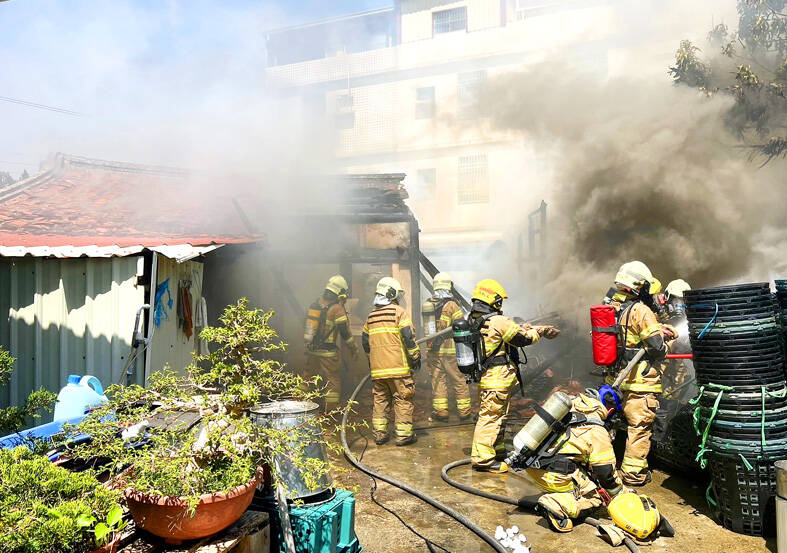Gas supply firms must take responsibility and bear the costs of improved protection measures by installing safety shutoff valves and microcomputer gas meters for household users, the Consumers’ Foundation said on Thursday following a leak that caused blazes in Hsinchu County last month.
Officials said the June 24 incident was due to damage to a control valve at a supply terminal in Jhubei City (竹北), leading to excess flow of gas, as the normal gas pressure of 200mm of water gauge spiked to about 1,000mm of water gauge within a few minutes.
When household users turned on a gas stove or water heater, the excess pressure burst open the control valve and resulted in leaks that caused fires at several apartment buildings in Jhubei.

Photo courtesy of a reader
Seven people sustained injuries and a teenager is fighting for their life after suffering severe burns, officials said.
The foundation in a statement said that Hsinchu Gas Co, which is owned by the Hsinchu County Government, urgently needs to enhance safety measures for household users, with the priority to install safety shutoff valves that cut off the flow of gas when the pressure is too high.
The valves cost NT$350 to NT$400 each, the statement said.
“It is not too expensive and lasts for more than five years, protecting the lives and property of household users. It also benefits the gas company as it reduces leaks, helping the firm avoid the high costs of financial compensation for people hurt in gas explosions,” the foundation said.
The foundation urged the nation’s gas firms to foot the bill and install safety shutoff valves for all customers.
The foundation also urged the firms to install new microcomputer gas meters, which cost more than traditional gas meters, but are safer.
Currently customers must apply for a new meter and pay the installation and replacement fees themselves, so not every customer is willing to upgrade, it said.
“It is unreasonable for gas firms, who are making profits, to transfer the cost burden of installing new meters to its customers,” the foundation said.
The foundation said that gas explosions result in serious injuries and fatalities, as well as damage to public and private properties.
“Therefore gas firms should make more regular inspections to check all pipelines, control valves and switches. Also authorities should make regular safety inspections, and also unannounced inspections, at all gas depots,” it said.
The foundation said that people should ensure they are using gas devices which conform to safety standards, and install safety shutoff valves and a new microcomputer gas meter.
If there is a smell of gas in the household, the foundation urged people not to turn on any electrical appliances and immediately open windows and doors to provide ventilation, then turn off the gas and arrange a safety check.

Taiwanese can file complaints with the Tourism Administration to report travel agencies if their activities caused termination of a person’s citizenship, Mainland Affairs Council Minister Chiu Chui-cheng (邱垂正) said yesterday, after a podcaster highlighted a case in which a person’s citizenship was canceled for receiving a single-use Chinese passport to enter Russia. The council is aware of incidents in which people who signed up through Chinese travel agencies for tours of Russia were told they could obtain Russian visas and fast-track border clearance, Chiu told reporters on the sidelines of an event in Taipei. However, the travel agencies actually applied

Japanese footwear brand Onitsuka Tiger today issued a public apology and said it has suspended an employee amid allegations that the staff member discriminated against a Vietnamese customer at its Taipei 101 store. Posting on the social media platform Threads yesterday, a user said that an employee at the store said that “those shoes are very expensive” when her friend, who is a migrant worker from Vietnam, asked for assistance. The employee then ignored her until she asked again, to which she replied: "We don't have a size 37." The post had amassed nearly 26,000 likes and 916 comments as of this

New measures aimed at making Taiwan more attractive to foreign professionals came into effect this month, the National Development Council said yesterday. Among the changes, international students at Taiwanese universities would be able to work in Taiwan without a work permit in the two years after they graduate, explainer materials provided by the council said. In addition, foreign nationals who graduated from one of the world’s top 200 universities within the past five years can also apply for a two-year open work permit. Previously, those graduates would have needed to apply for a work permit using point-based criteria or have a Taiwanese company

The Shilin District Prosecutors’ Office yesterday indicted two Taiwanese and issued a wanted notice for Pete Liu (劉作虎), founder of Shenzhen-based smartphone manufacturer OnePlus Technology Co (萬普拉斯科技), for allegedly contravening the Act Governing Relations Between the People of the Taiwan Area and the Mainland Area (臺灣地區與大陸地區人民關係條例) by poaching 70 engineers in Taiwan. Liu allegedly traveled to Taiwan at the end of 2014 and met with a Taiwanese man surnamed Lin (林) to discuss establishing a mobile software research and development (R&D) team in Taiwan, prosecutors said. Without approval from the government, Lin, following Liu’s instructions, recruited more than 70 software